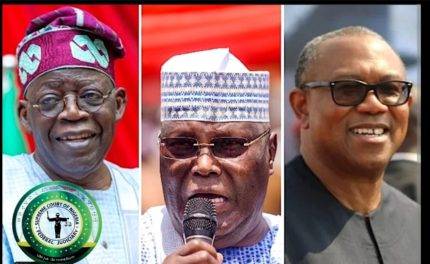Former Vice President, Atiku Abubakar, faces an uphill battle within the People’s Democratic Party (PDP), as key party figures signal a shift away from his influence. Dr Umar Ardo, the former Special Adviser on Research and Strategy to Atiku, asserts that the majority of PDP organs are no longer aligned with the former vice president. Ardo points to the period of Atiku’s absence from the party and the strategic moves made by influential governors, particularly Nyesom Wike, in shaping the party’s leadership during that time.
Wike’s role in appointing key figures such as Ali Modu Sheriff and influencing the choice of candidates in states like Adamawa sheds light on the intricate power dynamics within the PDP. Ardo contends that Atiku’s return to the party in 2017 was marked by concessions to governors, compromising his ability to shape the party’s direction. The recent removal of Uche Secondus and the installation of Iyochia Ayu further exemplify the power struggles within the party, leaving Atiku on the fringes.
Tactical Missteps and Loss of Party Support
Dr Ardo, who served as Atiku’s adviser during his vice presidency, highlights strategic errors that have diminished Atiku’s standing within the PDP. Ardo emphasizes Atiku’s reliance on perceived entitlement to the party’s leadership, leading to a loss of influence when key figures began to dissent. The former adviser points to Atiku’s willingness to accept the governors’ preferred candidates in the 2019 elections as a strategic misstep that weakened his grip on the party.
Moreover, Ardo sheds light on Atiku’s handling of the aftermath of the Supreme Court judgment on his 2019 presidential appeal. The absence of key party figures, including governors, at Atiku’s press conference contrasts sharply with their immediate endorsement of the court’s decision and their subsequent praise for Wike. Ardo argues that these events underscore a lack of support for Atiku’s presidential ambitions within the party ranks, urging him to reconsider his stance if he wishes to salvage his standing.
Wike’s Endorsement and PDP Governors’ Allegiance Shift
The recent actions of PDP governors further solidify the notion that Atiku’s days within the party are numbered unless he abandons his presidential aspirations. The conspicuous absence of key figures at Atiku’s press conference and the subsequent endorsement of Wike by party governors hint at a significant shift in allegiance. Bauchi State Governor, Bala Mohammed’s visit to the Presidential Villa and his praise for President Bola Tinubu’s intervention in PDP affairs add another layer to the complex intra-party dynamics.
This apparent divergence of interests within the PDP raises questions about Atiku’s ability to navigate the intricate political landscape. Dr Ardo suggests that a strategic withdrawal from the presidential race might be the key to regaining the support of influential party figures. If Atiku chooses to prioritize party unity over personal ambitions, the governors may rally around him, praising his statesmanship and leveraging his support for their individual political pursuits.
Inability to Navigate Wike’s Influence
Dr Ardo underscores the need for tact and sophistication in dealing with Nyesom Wike’s influence within the PDP. Atiku’s group, according to Ardo, appears to lack the necessary strategy to address Wike’s prominence effectively. The former adviser points to Wike’s pivotal role in the removal of Uche Secondus and the subsequent endorsement of Iyochia Ayu as indicative of the challenges Atiku’s faction faces.
Wike’s continued presence in the PDP without facing sanctions suggests a broader power imbalance within the party. Ardo emphasizes the importance of addressing Wike’s influence with strategic finesse, acknowledging the delicate nature of internal party dynamics. Without a nuanced approach, Atiku risks further isolation within the PDP, with his presidential ambitions becoming an obstacle to maintaining a cohesive party structure.
Supreme Court Fallout and Atiku’s Waning Support
The fallout from the Supreme Court judgment on Atiku’s 2019 presidential appeal serves as a turning point in assessing the former vice president’s standing within the PDP. Ardo points out the stark contrast between the lukewarm response to Atiku’s press conference and the swift endorsement of Wike’s leadership by key party figures. The subsequent press conference at the Presidential Villa, where Governor Bala Mohammed praised President Tinubu’s intervention, raises questions about the level of support Atiku commands within the party.
Ardo suggests that the disagreement between Atiku and the PDP governors on the Supreme Court’s decision indicates a deeper schism that transcends the legal aspects of the case. The lack of solidarity with Atiku among party elites hints at a broader disillusionment with his leadership, necessitating a reassessment of his political strategy to regain relevance within the PDP.
Prospects for Atiku’s Future in PDP
As Atiku contemplates another bid for the presidency in 2023 and explores the possibility of merging the PDP with the Labour Party and NNPP, questions arise about his future within the party. Dr Ardo’s insights into the dynamics of power, strategic missteps, and the shifting allegiances within the PDP paint a challenging picture for Atiku. The former adviser’s suggestion that Atiku’s days within the party are numbered unless he relinquishes his presidential ambitions underscores the urgency of a recalibrated political strategy.
The upcoming 2023 elections may prove to be a make-or-break moment for Atiku within the PDP. The delicate task of navigating party dynamics, addressing key figures’ concerns, and presenting a united front against President Tinubu requires a strategic approach that balances personal aspirations with party interests. Atiku’s ability to adapt and recalibrate his political trajectory may ultimately determine his longevity and relevance within the PDP.
Table of Contents
Discover more from OGM News NG
Subscribe to get the latest posts sent to your email.














